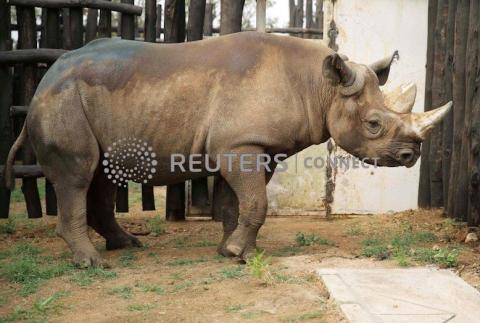Advertisement
Rwanda's rhino population grows, tourists expected to increase
KIGALI (Reuters) - Rhino keepers who successfully delivered five endangered black rhinos to Rwanda spent months hugging and coddling them inside their transport boxes to prepare them for the journey, a rhino handler told Reuters as the animals were freed on Monday.
The two male and three female eastern black rhinoceroses were flown from Safari Park Dour Kralove zoo in the Czech Republic, where they had been getting to know each other after arriving from separate European parks.
"The preparation process took several months. It started in autumn last year when two animals were brought here from Denmark and England. They started to bond, which always takes weeks because black rhinos are very alert and nervous animals," said rhino handler Jaromir Sejnoha from the Dvur Kralove Safari Park.
"In the final phase (of preparations) the rhino is trained to stay inside the box for several minutes. We feed them and hug them in there, so they aren't scared of the box and become accustomed to it, and so on the day of transportation they don't get nervous and the whole transportation goes smoothly."
There are only about 1,000 black rhinos left in the wild, Jes Gruner, the Akagera National Park manager, told Reuters. The new arrivals mean Rwanda is home to 25 of them.
Tourism is a key foreign exchange earner in the East African nation, home to mountain gorillas and the so-called "Big Five" African game animals - lions, rhinos, elephants, buffalo, and leopard.
"Every year our tourism numbers are going up and bringing these rhinos I am sure will help," Gruner said.
The park received 44,000 visitors who generated over $2 million last year, Gruner said.
In 2017 tourism earned Rwanda $437 million. Clare Akamanzi, chief executive of the Rwanda Development Board, said 2018 numbers were not yet ready due to a change of methodology.
The push for tourist dollars in not without controversy. The government's 2018 deal to pay British soccer club Arsenal 30 million pounds ($38 million) to have "Visit Rwanda" emblazoned on the team's jersey was criticized by politicians in some donor nations who questioned whether it was a good use of money by a government still heavily dependent on foreign aid.
(Reporting by Clement Uwiringiyimana; Editing by Katharine Houreld and Alexandra Hudson)



















Add new comment